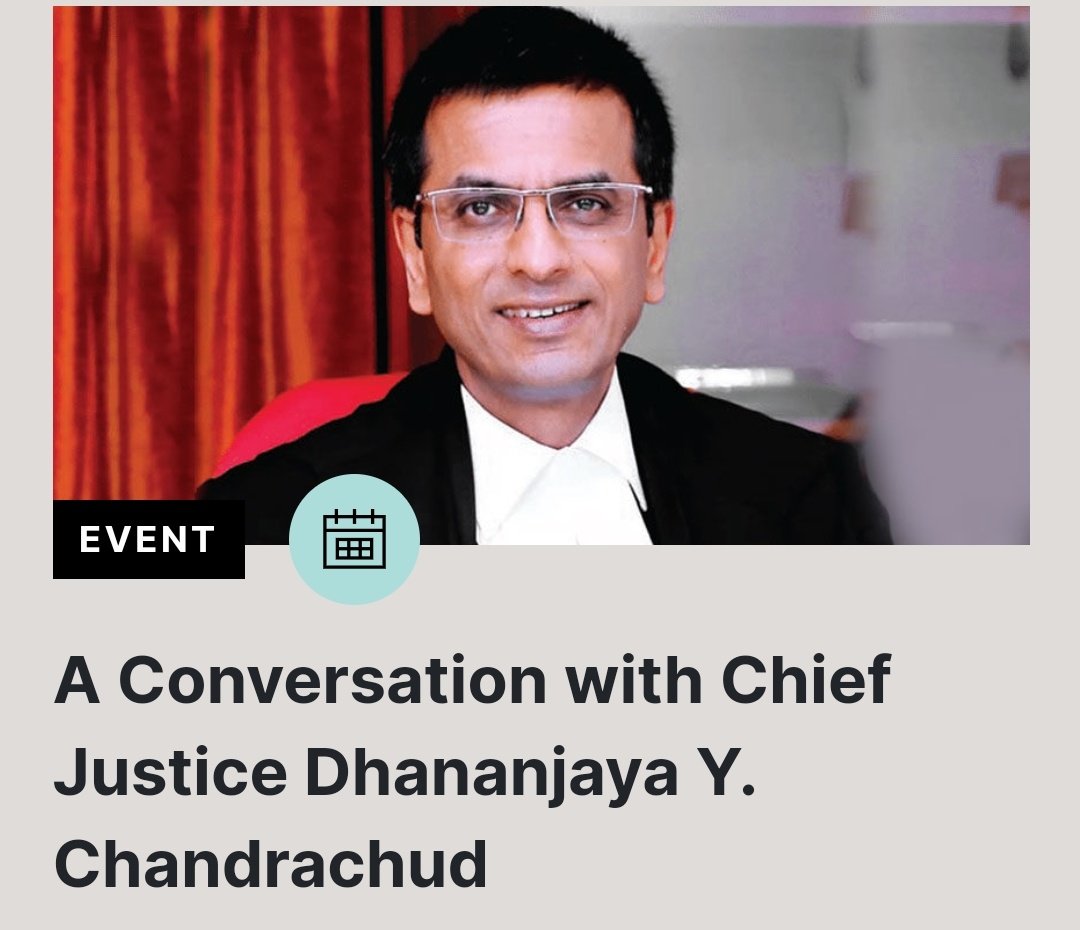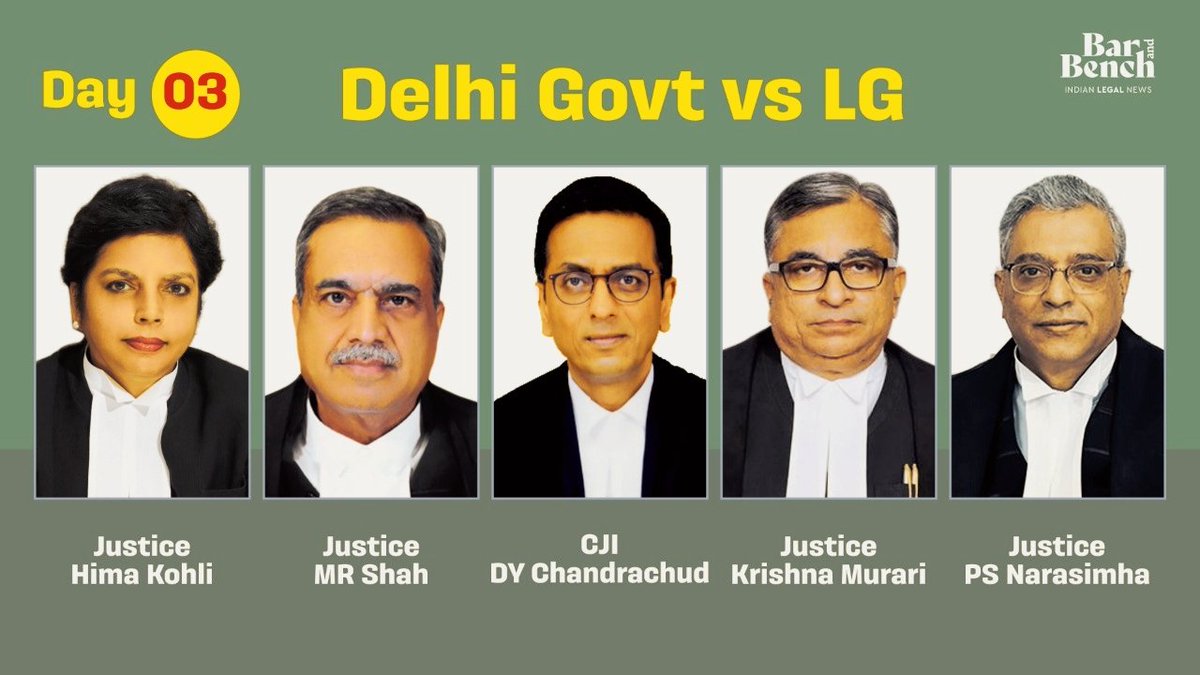
Chief Justice of India DY Chandrachud to be presented with Harvard Law School's Award for Global Leadership. Professor David B. Wilkins will be in a conversation with CJI Chandrachud.
Follow thread for live updates
@Harvard_Law #SupremeCourtofIndia #CJIDYChandrachud
Follow thread for live updates
@Harvard_Law #SupremeCourtofIndia #CJIDYChandrachud

Prof Wilkins: CJI Chandrachud has been a brilliant lawyer, judge at Bombay HC, A supreme Court judge and now the 50th CJI. He has been a stalwart defender of liberty and fundamental rights which is the hallmark of rule of law #SupremeCourt @Harvard_Law
Prof Wilkins: we are bestowing the highest award, the award for global leadership at this stage of CJI Chandrachud's career. This award has been earlier awarded to Brad Smith, VC of Microsoft, then to the adviser to the President of the US
#SupremeCourt
@Harvard_Law
#SupremeCourt
@Harvard_Law
Prof Wilkins: CJI Chandrachud is the inheritor of an incredible legacy of his father who was the former CJI and also the legacy of his mother who was accomplished musician.
#SupremeCourt
@Harvard_Law
#SupremeCourt
@Harvard_Law
CJI: I spent many years in Harvard, first for my LLM and the JSD. My discharge of my duties has been grounded due to the time spent there. This award marks not only as a recognition of the work done in past but also to my duty as the CJI now 

CJI: As the judge of the highest constitutional court of the country, my allegiance lies to the Constitution of India and I believe it is the duty of a judge to uphold the principles of liberty, equality and fundamental rights.
#SupremeCourt
@Harvard_Law
#SupremeCourt
@Harvard_Law
Prof: In 2 years you produced a thesis/ 350 pages one volume and another volume of 350 pages. I could not lift both of them.
#SupremeCourt
@Harvard_Law
#SupremeCourt
@Harvard_Law
Prof: Your thesis was exceptionally prescient. It was on protection of minority rights in India and the complex issues it raises. This has been a deep passion of yours. This is an issue of many many society including the USA. What is your view..key questions on this
CJI: When I commenced studies at Harvard for SJD, I came from the background of a law school, Campus Law Centre, which had a strong thrust on public law and had professors like Latika Sarkar, Upendra Baxi and many others.
CJI: The thesis begins with affirmative action and to right the wrongs committed in our society. one of the question which has troubled me is how do we think of merit ? when we think of affirmative action... I think are we diluting merit
CJI: when we admit in law schools, does your score justify how will you act in accordance with public responsibility. affirmative action should foster merit and not exclude it and take in its fold those who has been stereotyped. we need to re-define the concept of merit
Prof Wilkins: Michigan Law School did a study to correlate the entrance exam scores and the three things which the law school wants from its students. Turned out LSAT and public service had a negative correlation. Higher score lesser public service
Prof: In the Delhi event of 2017 you had spoken on Mental health of lawyers. You had spoken on mental health of younger lawyers. since then there has been increasing interest in the issues. What do you think of it now?
CJI: There are several cause of mental health issues in legal profession. One cause is the adversarial tenure. People take pride in it which makes it stressful. long nights, overworked, financial worries. Those who dont work in corp law are not compensated properly
CJI: in some areas law is still a feudal profession and where exclusion is existing and it is difficult for minorities, queers, women. Mental health can improve performance in long run. we have developed a system which awards excellence at the cost of everything else
CJI: we need to stop glorifying overworked or being burnt out. we need to increase holistic working. One is paying living wages and there has to be reasonable expectation within the profession. We need to dispel the stigma of mental health issue around the profession
CJI: We need to adopt an intersectional approach concerning mental health.
Prof: technology has been reshaping the legal profession. But the legal profession has been slow to adopt it. no one thinks we will go back totally to the physical form of hearings. please tell us how will technology reshape courts
CJI: real challenge before us is to go beyond just being paperless and instead use technology to bring about a digital transformation. during pandemic CJI called me and said we have to shut down courts. then we got together all things and started virtual hearing
CJI: we had to hear bails, where there was arbitrary arrests to ensure human liberty and thus used virtual mode to impart justice. But we need to recognize the existence of digital divide. supreme court is no longer a supreme court in delhi but is truly the SC of India
CJI: more women have appeared by virtual mode during lockdown. last week we inaugrated e-SCR where judgments are available free of cost and improves financial accessibility. we are also moving to live streaming of court proceedings,
CJI:Live streaming promotes sense of confidence in the working of courts, we have virtual hearings, paperless courts, we are trying to curb digital divide, digitization of hard copy case files. technology is really replete with potential. AI and machine learning can be deployed
CJI: technology gives us a medium to replace the colonial model of justice where litigants had to reach out for justice and here the institution can reach out to dispense justice
Prof: where do you see legal education going forward?
CJI: No better place than law school to implement some of the ideas like technology, prevent racial discrimination etc. law school introduces them to legal ethics, advocacy etc. law school presents a huge learning curve
CJI: No better place than law school to implement some of the ideas like technology, prevent racial discrimination etc. law school introduces them to legal ethics, advocacy etc. law school presents a huge learning curve
CJI: This would lead to a society which is more inclusive and the legal profession has been feudalistic and has not been welcoming of women and racially disadvantaged. Law schools can broaden the access of justice system and impact will be felt decades later
CJI: I am often asked why there are no more women judges in the supreme court. answer to it lies as the profession it was three decades ago. pool of judges coming to sc is from a pool which 3 decades ago.
CJI: unless we change foundational value of legal profession now we cannot change the scenario in the future and thus law schools have an important role to play/. So many of my clerks have no family contact with law and challenge is how do we mentor them
Prof Vikramaditya Khanna:you have recently delivered a judgment which increased access to abortion.. some comments 

CJI: The judgment was rooted in dignity and human autonomy. Statute gave longer period to abort to women who were married. Here it was a case of a young unmarried women and we held that abortion is a right for even unmarried women
CJI: Many countries which will face such questions must be signatory to CEDAW and UDHR, many western democracies look at development in each others jurisprudence and it is time they look at the global south, i say this without sounding patronizing.
CJI: assault to human dignity is not at all acceptable and that autonomy entitles her to take decisions in such crucial junctures and in matters which involves herself
CJI: I am judge and I have been a judge and a lawyer. while we do depend on courts to realize rights. the journey for such realization is beyond legal arena and it is about life which is a gamut of experiences.
CJI: social movements thrive on law but also at the same time look beyond law since courts have limitation in the nature of reliefs to be granted. Thus social movements at intellectual levels are needed
Prof Khanna: can you give some examples of your own decisions where you relied on scholarly articles
CJI: On comparative law, the first was the decision where we ruled privacy is a fundamental right. We grounded that to right to life and personal liberty. We relied upon articles
CJI: On comparative law, the first was the decision where we ruled privacy is a fundamental right. We grounded that to right to life and personal liberty. We relied upon articles
CJI: another was the judgment where we decriminalized homosexuality and the third was on affirmative action and the contours of merit, what constitutes merit, and we referred upon scholarly articles for the same.
CJI: Scholarly articles can help trace legal history and also held carve out nuances long before such nuances arise in the court of law. these breathe life into the black letters of law
Q: do you anticipate greater use of comparative material?
CJI: world is a global village. technology and ease of travel has got us together. social media has also got us close. it is a medium which has changed the way we live, think and move.
CJI: world is a global village. technology and ease of travel has got us together. social media has also got us close. it is a medium which has changed the way we live, think and move.
CJI: the world which is deeply interconnected helps us in imbibing values from each other and we cannot live in silos.
CJI: judges live an isolated life where we are lost in work and a nature of our office requires us to maintain independence by staying away from society and that isolation can be a danger to robust judging.
CJI: When we see we are not alone in our work it helps us. the challenges we deal can breed cynicism in the way law works for our society and cynicism cannot take the better part of your work. that is why connecting with others with deep bond of humanity is imp
CJI: the answer lies in connecting with people in terms of their written work, or their art, music, paintings.
Prof Khanna: that was an incredible answer.
Prof Khanna: that was an incredible answer.
Prof Wilkins: You justify all the reasons why we have bestowed this award upon you. Thank you for being with us. I look forward to continue this conversation and give the award physically.
• • •
Missing some Tweet in this thread? You can try to
force a refresh












